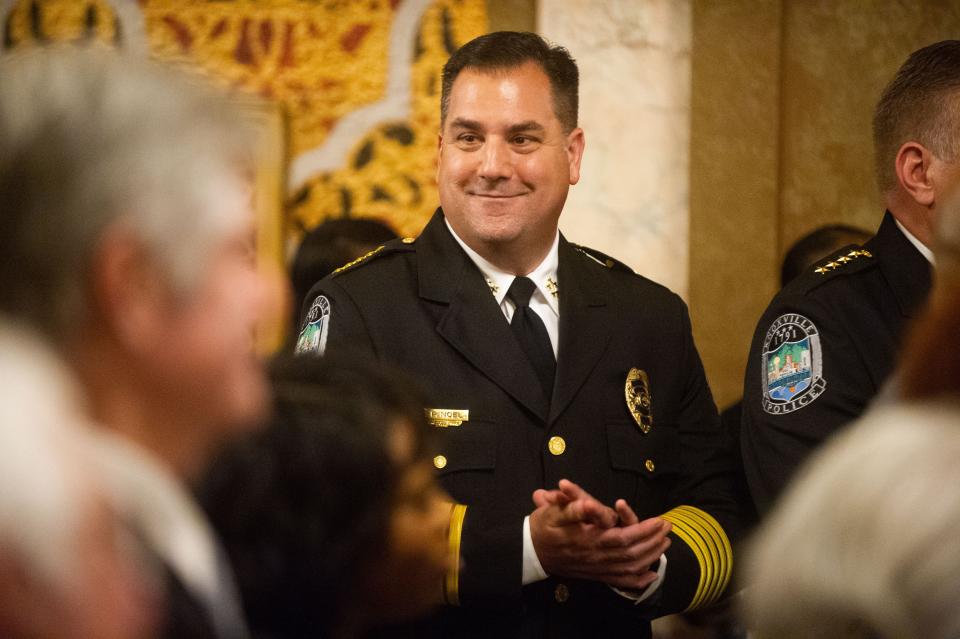Why Knoxville Police Chief Paul Noel has focused on internal affairs one year into the job
- Oops!Something went wrong.Please try again later.
On the tail end of a disciplinary process in March, Knoxville Police Chief Paul Noel did something that has rarely, if ever, been done in the department: He disagreed with an internal affairs investigation finding.
Noel cleared officer Shelley Clemmons after the investigation concluded she violated department policies on insubordination and truthfulness. He did agree with the findings related to her misuse of her patrol car, and he suspended her without pay for five days and didn't let her drive home with a patrol car for 120 days.
As he approaches his first anniversary as police chief, Noel has changed the department's structure and shaken up the status quo. Perhaps no area has undergone more change than KPD's internal affairs unit, which is charged with investigating officers' conduct.
When he arrived, Noel was charged with cleaning up a department that had holes in the leadership structure because of a wave of resignations and retirements stemming from numerous scandals. It was his job, too, to fix a culture of endemic racism.
And it came on top of a tremendous spike in homicides during the pandemic.

He worked to take on the issues one by one.
Noel has completely changed the department's reporting structure of internal affairs by adding a deputy chief and an assistant chief to oversee the unit. He stopped internal affairs investigators from performing background checks on new recruits, which he called a stumbling block to officers of color and women.
He has pushed to modernize the department’s data capabilities – which eventually will be available for all to see on the department's new website – and is making sure officers understand community policing isn’t an option, but a requirement.
Most recently, he reassigned two of the three internal affairs investigators and the unit supervisor retired.
Prone to talk in sports analogies, Noel said he laid out an offensive scheme: The most problematic aspects of the department's culture have been addressed. Staffers are in new positions.
Next up is more coaching and better matching of staffers' strengths to positions in which they serve.
As the first chief to come from outside of Knoxville, he is facing internal and external pressures. And he's ready to stick with his plan.
Internal affairs is where things start
Brian Higgins is an adjunct professor at John Jay College of Criminal Justice and a former police chief and public safety director in Bergen County, New Jersey. He said Noel’s focus on internal affairs is critical to improving the department because that unit's work builds rapport with community members.
“Do people trust the cops? Do they police their own? Do they take their own standards and oaths serious enough? Internal affairs is key,” he said. “If you don’t have the trust that you’re going to police your own, then you don’t really believe the rules are the rules, that they’re just there (as guidelines) … it’s kind of the meat and potatoes of managing a police department.”
Internal Affairs is no longer involved in recruiting

Noel has to work to match the department's racial makeup to that of the greater community. It is woefully short on officers of color, employing 15 officers or just 4% of the force, compared to the city of Knoxville's 16% Black population.
To hire additional underrepresented officers to serve now and eventually move into leadership roles, Noel adjusted rules related to tests and skills requirements.
“There were just many things that were hard and fast rules, and it would keep people out,” he said. “And they have kept people out of this department who are now successful police officers at other departments.”
None of the changes will lower the standard for the type of officers KPD hires, he said. The academy system is the same, with modifications and enhanced training.
Background check change
This starts with how the department recruits applicants. Previously, internal affairs investigators looked into their backgrounds. Noel said that's not considered a best practice, mainly because internal affairs staffers are trained on rulebook violations while a background check is looking at “overall character” of the applicant.
Potential officers were getting flagged for things that shouldn’t have been inhibitors, he said. Personnel staffers will screen applicants going forward.
Testing changes
Noel is changing how the department tests potential hires. He got rid of an old multiple choice test because it did a poor job of predicting whether officers had the moral character needed for the job, he said.
“Do they have what it takes integrity-wise, character-wise, psychological-wise, to be a police officer? We can teach everything else,” he said.
Changes to ‘personal history’ questionnaire
Noel said the department is changing how it views its long-used questionnaire that requires applicants to list any and every negative interaction or incident they have been a part of. If an officer forgot something and they brought it up later – even sometimes the next day – it was a disqualifier.
“What I would say to that is that shouldn’t be an automatic disqualifier,” he said. “What we should do is probe into that a little more, and do a deep dive and (find out) why didn't you disclose that? But as long as it's reasonable, then, you know, we're hiring from the human race.”
Reimagining the work
Soon after his arrival, Noel changed the internal affairs command structure. Previously, three investigators reported to one commander, who reported to the chief.
Now, three investigators report to one commander, who reports to new Deputy Chief Brooklyn Belk, who reports to Assistant Chief Mark Fortner, who reports to Noel. This was designed to speed up the investigative process so multiple layers of review work can happen before Noel signs off on investigations.
It wasn’t fair to the investigators to wait on the chief to sign off on every detail previously, he said.
Within the internal affairs, Capt. Steve Stills retired and Sgts. Rachel Britt and Amanda Bunch transitioned to patrol supervisor roles. Noel called it a lateral move. They’ve been replaced by Capt. Brian Evans, the unit commander, Sgt. Andrew Markham and investigator Phyllis Tonkin.
The changes ruffled some of the veteran officers. Noel said he expected pushback.
“I wouldn't call it a messy move at all,” Noel said. “But I will acknowledge that change is challenging, and I’ve spoken about it a lot. … I acknowledge that we are changing, we’re making major changes within the police department and that can be challenging for people.”
Higgins, the adjunct professor, said officers leaving the department – whether they worked in internal affairs or not – can be healthy. This is why the city brought in an outside perspective with its chief, he said.
“Those who are staying are probably the ones who are hoping he fails or like the fresh start,” he said. “And those who left, that’s OK. ‘Goodbye.’ That’s why you brought in an outsider; things weren’t going well and you needed a fix. You’re sending a message just by bringing in an outsider.”
Culture is an issue
Arguably, the area Noel had to address most urgently when he started was a culture in need of serious attention. Before he arrived, two lengthy Knox News investigations detailed a series of sexual harassment issues and coverup and a culture of racism that was covered up by top commanders.
Separately, in the three years before Noel arrived, nine officers, including two deputy chiefs, resigned or retired amid scandal.
Often the best way to fix those systemic problems is to hire someone from outside the department, Higgins said.
“Racism and sexual abuse are the biggest issues for departments. Their tentacles can be so pervasive and negative,” he said. “Corruption is a pocket, and you can clean it out. But the other has so many layers that it’s hard.”
How understanding little things can lead to big improvements
Even with all the positive changes, failures can be catastrophically damaging.
A recent example is the arrest of Lisa Edwards, who collapsed in police custody and later died of a stroke. Officers demeaned her over and over as they tried to get her into a police van while she begged for medical help.
The officers were found not to have caused Edwards’ death, but three officers were punished, including one who was demoted from sergeant back to a regular officer.
In his statement that went along with the release of the department’s internal affairs review, Noel said KPD has a problem with how officers talk to community members. The situation also represented a failure of supervision, he said.
Noel said he has stressed to officers his commitment to community policing, which he said was sorely lacking when he arrived. Everyone should be involved with the people in their area of town. They should be asking what struggles they face.
“Very rarely is it murders and shootings,” Noel said. “You name it, but it’s the low-level stuff and it's getting the officers to understand that the low-level things are sometimes the most important things.
“The murders and shootings and robberies are the easy part – they’re down double digits by the way – but the low-level stuff is the hard stuff,” he continued. “Not getting them to do that, but helping them understand why we’re doing that because it’s important to those particular people.”
And while he’s had pushback on some of his changes, he said that just comes with the job.
“The overwhelming majority of the people in this organization have embraced all of these changes we’ve implemented,” he said. “We’ve thrown a lot. It’s a lot to be at a department that’s been doing things one way for a long time, and we’re throwing a lot of changes at them and I’m very proud of how they’ve embraced that.”
Tyler Whetstone is a Knox News investigative reporter focused on accountability journalism. Email tyler.whetstone@knoxnews.com. Twitter @tyler_whetstone.
This article originally appeared on Knoxville News Sentinel: Knoxville Police Chief Paul Noel focuses on internal affairs unit

